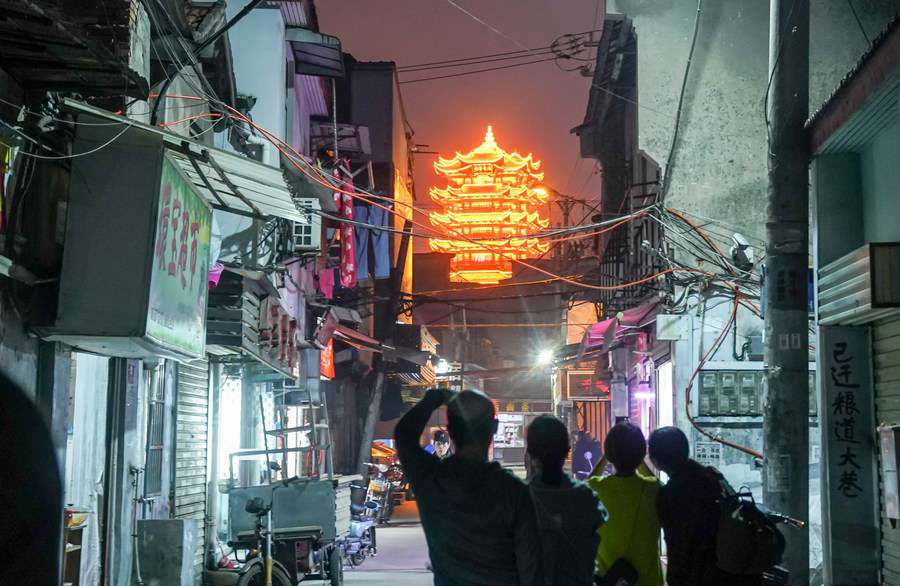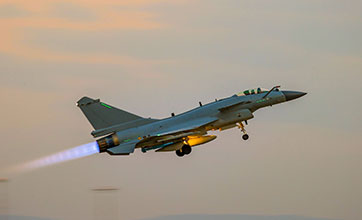Commentary: Resolution not rhetoric forms Wuhan's immunity against COVID-19 resurgence

People walk on a commercial street in Wuhan, central China's Hubei Province, March 28, 2021. (Xinhua/Cheng Min)
BEIJING, April 8 (Xinhua) -- A year after Wuhan lifted its lockdown, the Chinese city that witnessed a landmark victory against the coronavirus outbreak continues to inspire the world by shining as a post-pandemic "safe zone."
The megacity in central China's Hubei Province has not reported any locally transmitted COVID-19 cases for the past 10 consecutive months, a remarkable feat considering the raging spread of the virus and its variants globally, and the sporadic cluster infections in some other Chinese cities.
The city has not been vocal against all the groundless and politically motivated mud-slinging, conspiracy theories and scapegoating by the West, but has instead spent its energy on a more pragmatic agenda: building up a long-term defense to protect local people.
What could be the antibodies Wuhan has gained? The answers are not surprising. Building on its initial success against the virus, the city has continued to strengthen its grassroots response system, and the government-led initiatives from mass testing to mass vaccination have received resolute cooperation from the public.
First, by firmly enforcing quarantine rules and offering free testing to the entire city, Wuhan has effectively doused community sources for virus resurgences.
After new infections petered out, the city of 11 million people became the first in the world to test its entire population except for young children in May last year. The drive found only 300 asymptomatic cases, who were immediately quarantined. The swift testing helped lift the city's psychological lockdown and expedited the resumption of life and work.
Second, the city has firmed up its immune cells. In the past year, Wuhan set up teams for epidemiological investigation, disinfection, testing and epidemic control each comprising around 1,000 members, as well as a support group of 10,000 "assistant investigators." The use of big data and other digital technologies helped achieve efficient coordination to nip new threats in the bud.
Third, the city has not lowered its guard since it lifted the lockdown. Wuhan ordered weekly nucleic acid testing on workers handling imported frozen foods after reports of the virus found on cold-chain products. It has conducted daily tests on public spaces including markets, public vehicles and hospitals, with all 760,000-plus environmental samples collected since July 30 testing negative.
Finally, Wuhan residents, who made great sacrifices during their fight against COVID-19, have continued to endorse and cooperate with government initiatives including the ongoing vaccination drive. They have stood in solidarity with the city and showed genuine trust in the Chinese model of epidemic containment.

People take pictures at an old street in Wuhan, central China's Hubei Province, March 28, 2021. (Xinhua/Cheng Min)
About 3.7 million COVID-19 vaccine doses have been administered in Wuhan and more than 149 million doses nationwide, as China builds a new shield against the virus. Meanwhile, China is helping other countries fight the pandemic with its vaccines and medical supplies, a sharp contrast to certain developed countries' self-centered approach of vaccine nationalism.
The heroic city of Wuhan has shown a strong economic recovery under regular epidemic control, as hefty investments continue to pour in. This reflects the robust and sustained economic recovery of China, which targets a growth rate of over 6 percent in 2021. In its latest report, the International Monetary Fund projected that the Chinese economy will grow by 8.4 percent this year, indicating China will continue to be a major contributor to the world's economic recovery.
Wuhan's victory against the intractable epidemic, along with the strategic outcomes of the entire country in this regard, has heralded a beacon of hope for a world struggling with the pandemic. It also proves that the hard-won success can be maintained through political resolution, social unity and painstaking efforts from every individual.
According to a report on the global tracing of COVID-19 origin recently released by the World Health Organization, "some of the suspected positive samples were detected even earlier than the first case in Wuhan, suggesting the possibility of missed circulation in other countries."
Wuhan has pulled through the epidemic ordeal and suffered so many groundless accusations involving the virus source. Just as the WHO report has indicated, science and time will give the Chinese city its due credit and respect, and its major sacrifice and contribution in the fight against the virus will gain more recognition internationally.
Photos
Related Stories
- One year after lifting lockdown, Wuhan has returned to the bustle and hustle of urban life
- Happy rebirth-day: Wuhan marks one year of recovery since COVID-19 lockdown ends
- Recap of Xi's remarks on China's crucial battle against COVID-19 in Wuhan, Hubei
- Global experts see COVID-19 lockdown in Wuhan last year as "timely, wise step"
- A city remembers: first anniversary of Wuhan's reopening
Copyright © 2021 People's Daily Online. All Rights Reserved.










